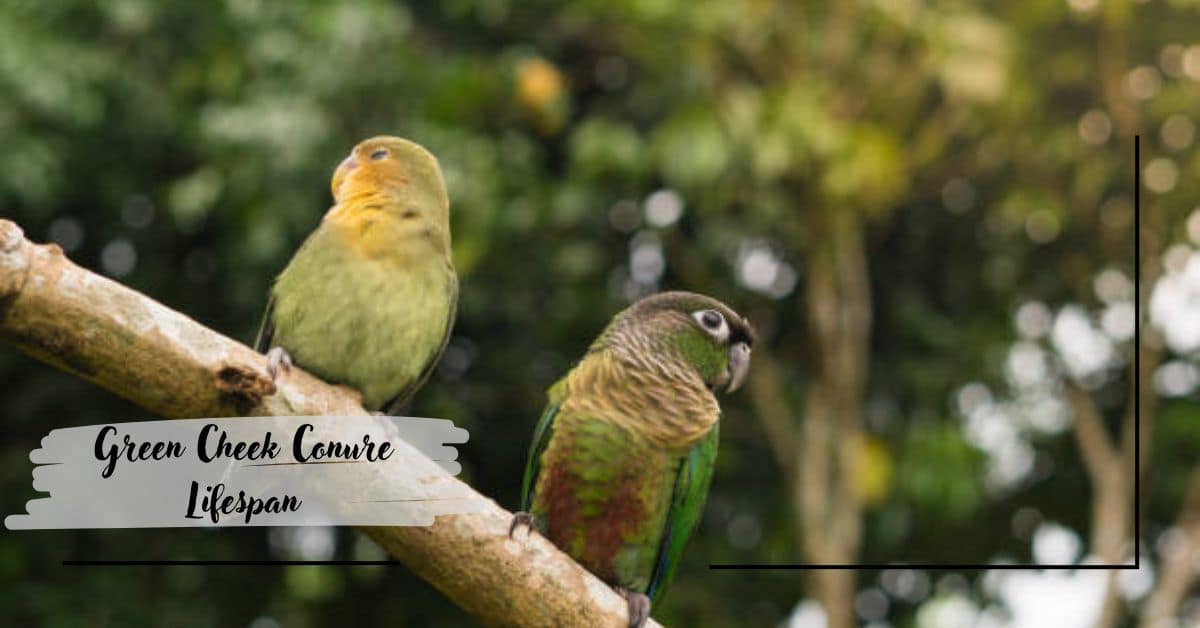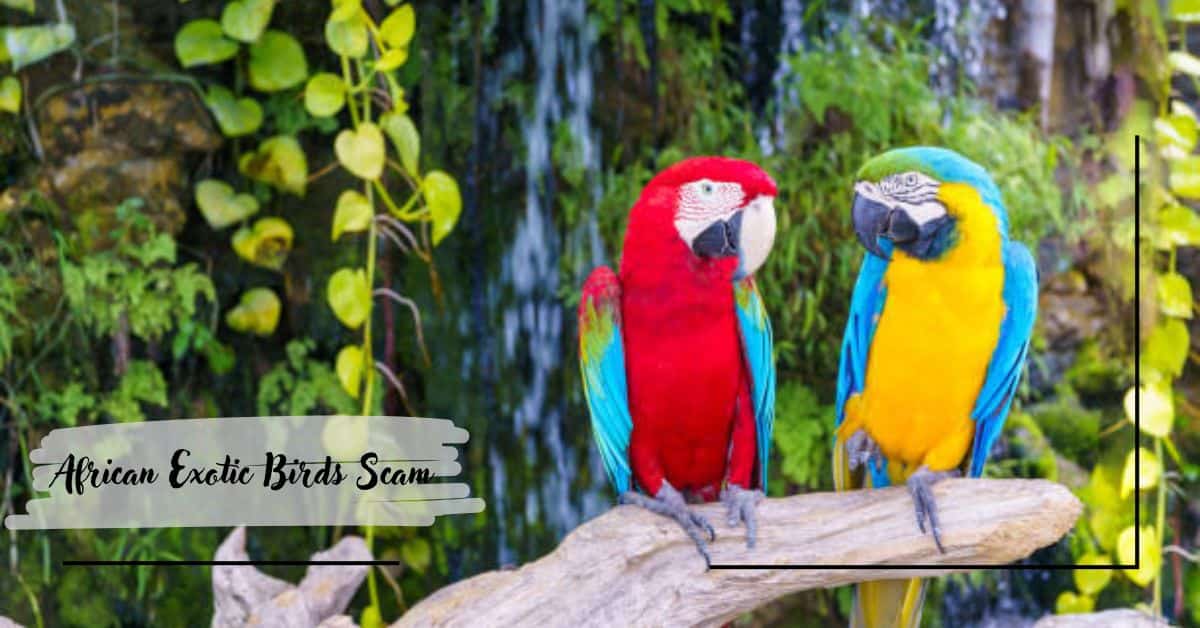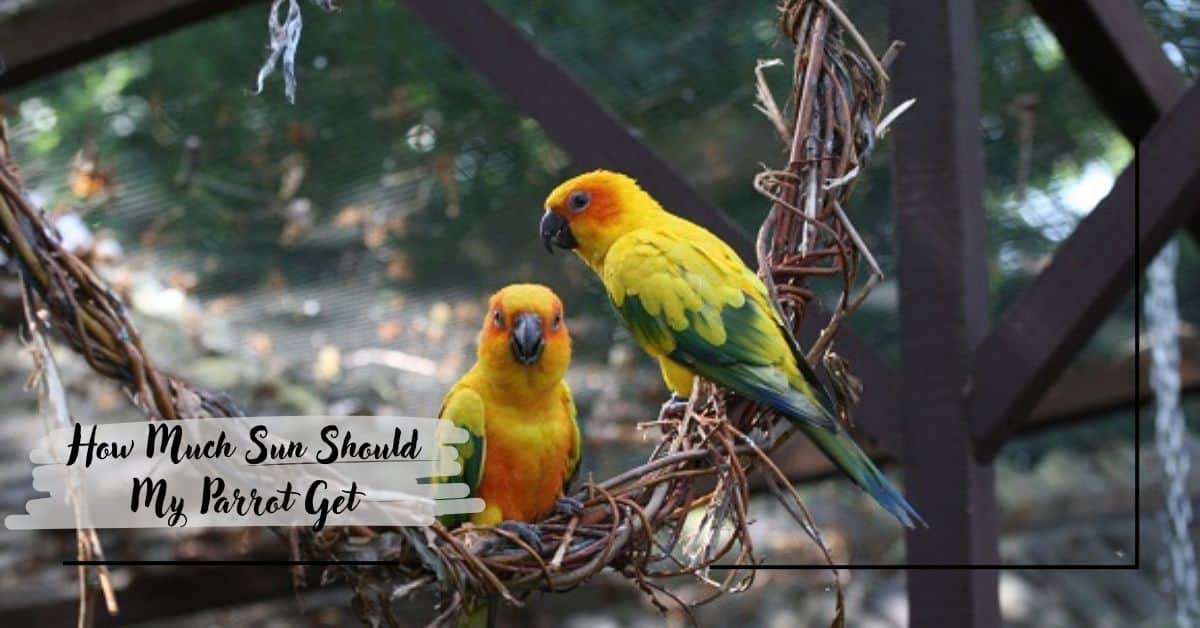Green Cheek Conure is a small, Beautiful, Colorful parrot species known for its Playing-ful and affectionate personality. It is an Intelligent Parrot species and a popular and unique pet among pet owners because of its small and easy-to-manage size and also for its quiet personality than other parrots because parrots talk a lot and always make noise in the home. Green Cheek Conure’s scientific name is Pyrrhura Molinae. GCC stands for Green Cheek Conure and re native to South America, specifically in areas like Brazil, Bolivia, and Argentina, where they inhabit forests and woodlands.
Green Cheek Conure Parakeets can live up to 10 to 20 years in Captivity. They can also live up to 25 to 30 years with great care of them. They can live longer with Good and proper care, Diet, food and environment. These factors affect a lot to the Green Cheek Conure Parakeets’ lifespan. A balanced Diet, Good Environment and Regular Veterinary Care can make them to live Up 25 to 30 years old.
How is the Green Cheek Conure’s Personality and Behavior?
Green Cheek Conures are known for their friendly and affectionate personalities. They are playful and social birds that enjoy interacting with their owners and other pets. Their curious nature makes them eager to explore their surroundings, and they often get into playful mischief. These conures are generally gentle and tend to bond closely with their human companions. They can be quite vocal, but their sounds are usually softer than those of larger parrot species. Overall, their playful demeanor and loving attitude make them delightful pets.
What is the Cost of the Green Cheek Conure?
The cost of a Green Cheek Conure can vary widely based on several factors, including age, color mutations, and where you purchase them. On average, you can expect to pay between $200 to $900 for a Green Cheek Conure including all the costs of cage, grooming and care food and also Veternity care. Prices might be higher for specific color variations, such as cinnamon or turquoise. Additionally, don’t forget to factor in the costs of their cage, food, toys, and veterinary care, which can add up over time.
How to Take Care of Green Cheek Conures?
Taking care of a Green Cheek Conure involves providing a safe and stimulating environment. Here are some key care tips:
Cage Setup:
Ensure their cage is spacious enough for them to move around. A cage size of at least 24x24x24 inches is recommended. Include perches of varying sizes and materials for climbing.
Social Interaction:
Spend time with your conure daily. They thrive on social interaction and can become bored or lonely if left alone for too long.
Exercise:
Allow them to explore outside the cage in a safe, supervised area. This keeps them physically active and mentally stimulated.
Cleanliness:
Regularly clean their cage, toys, and food/water dishes to maintain a healthy environment.
What is the Diet of the Green Cheek Conure?
A balanced diet is essential for the health of a Green Cheek Conure. Here’s what their diet should include:
- Pellets: High-quality pellets should make up the bulk of their diet. Look for pellets specifically formulated for conures.
- Fresh Fruits and Vegetables: Offer a variety of fresh produce, like apples, carrots, broccoli, and leafy greens. Avoid avocado and chocolate, as they are toxic to birds.
- Seeds: While seeds can be offered as treats, they should not be the main part of their diet due to high-fat content.
- Nuts: Occasional nuts can be a good treat, but they should be unsalted and given in moderation.
How Do Green Cheek Conures Communicate?
Green Cheek Conures communicate through a variety of vocalizations and body language. They make a range of sounds, including chirps, whistles, and soft squawks. While they can mimic some words, they are not as proficient at talking as larger parrots. They often express their emotions through their posture and movements; for example, a relaxed bird may fluff its feathers or perch comfortably, while a nervous bird might ruffle its feathers or cling tightly to its perch.
Health Issues with the Green Cheek Conures:
Green Cheek Conures can have a few health issues, just like any pet. Here are some common problems to watch for:
Obesity:
These little birds can easily gain weight if they eat too much. Keeping an eye on their food and giving them plenty of chances to play and exercise is important. Too much weight can lead to serious health problems, like heart issues.
Feather Plucking:
Sometimes, conures can pull out their feathers. This can happen if they’re stressed, bored, or not getting enough attention. To help prevent this, make sure they have lots of toys to play with and spend time interacting with them. If your bird starts plucking its feathers, it’s a good idea to talk to a vet.
Respiratory Infections:
These can occur if the air in their home isn’t clean. Make sure their cage is in a well-ventilated area and keep it free from smoke, strong smells, or harmful chemicals. If your conure is wheezing, coughing, or has a runny nose, it might have a respiratory infection, and you should see a vet.
Sneezing:
It’s normal for Green Cheek Conures to sneeze from time to time, especially if they get dust in their noses. However, if your bird sneezes a lot and has a runny nose or seems tired, it could be a sign of a problem. If you notice this, it’s best to consult a vet.
Psittacosis:
This is a sickness caused by bacteria that can make your bird feel unwell. Symptoms include looking tired, not eating, and having trouble breathing. This illness can also spread to humans, so it’s important to get your conure to the vet if you think it might have it.
Beak and Feather Disease:
This viral disease can affect how their feathers grow and how their beak looks. If you see your conure losing feathers or if their beak looks different, take them to the vet right away.
Do Green Cheek Conures Talk a Lot?
Green Cheek Conures are not known for their talking abilities like larger parrots, but they can learn to mimic sounds and a few simple words. Their vocalizations are generally softer, making them suitable for apartment living. They tend to be more communicative through their actions and body language than through speech.
What is the Maturity Age of the Green Cheek Conures?
Green Cheek Conures typically reach sexual maturity between 2 to 3 years of age. However, they continue to develop their personality and behavior throughout their lives. During this time, you might notice changes in their vocalizations, social behavior, and interactions with you and other pets.
Toys and Accessories Are Best for Green Cheek Conures
Providing toys and accessories is crucial for keeping your Green Cheek Conure happy and engaged. Here are some suggestions:
- Chew Toys: Wooden toys are great for their beaks and help prevent boredom.
- Swing and Climbing Toys: These encourage physical activity and exercise.
- Foraging Toys: Toys that require them to work for their food keep them mentally stimulated.
Rotate their toys regularly to maintain their interest and ensure they have plenty of safe options to play with.
Basic Tips for Owning Green Cheek Conures:
- Be Patient: It may take time for your conure to adjust to a new home. Building trust is essential.
- Provide Routine: Consistency in their daily routine helps them feel secure.
- Socialize: Spend quality time with your conure to strengthen your bond. They love attention and interaction.
- Monitor Their Health: Keep an eye on their eating habits and behavior. Any sudden changes can indicate health issues and should be addressed promptly.
- Educate Yourself: Understanding their needs and behaviors will help you be a better owner. Research and connect with other conure owners for tips and support.
FAQs about Green Cheek Conures
What Colors Do Green Cheek Conures Come In?
Green Cheek Conures have several beautiful colors. The most common one is green with a yellow belly and a dark red tail. There are also different color types, like Cinnamon, Turquoise, and Pineapple, each with their own special look.
Can Green Cheek Conures Be Kept Alone?
Yes, they can live alone, but they love being around other birds and people. If you’re gone a lot, it might be nice to get another bird for company. If you only have one, make sure to spend plenty of time with them every day.
How Long Do Green Cheek Conures Live?
With good care, Green Cheek Conures can live between 15 to 30 years. Feeding them healthy food, taking them to the vet regularly, and giving them a loving home can help them live a long, happy life.
Do Green Cheek Conures Need a Companion?
These birds are social and like to be with others. While they can be happy alone, having a buddy can make them even happier. If you get another bird, make sure to introduce them carefully so they get along.
How Can I Tell If My Green Cheek Conure Is Happy?
A happy Green Cheek Conure plays, chirps, and enjoys being with you. They may fluff up their feathers, explore their cage, and play with their toys. If they are eating well and having fun, they’re likely happy!
How Often Should I Bathe My Green Cheek Conure?
Green Cheek Conures love baths! You can spray them with water a few times a week or let them splash in a shallow dish of water. Bathing helps keep their feathers clean and healthy.
Are Green Cheek Conures Noisy?
Green Cheek Conures can make noise, but they are usually quieter than bigger parrots. They like to chirp and whistle, but they might get loud if they want attention. If you prefer a quieter bird, keep their noise level in mind when choosing one.
What Should I Avoid Feeding My Green Cheek Conure?
Some foods are not good for Green Cheek Conures. Avoid giving them avocado, chocolate, caffeine, alcohol, and salty snacks. Stick to fresh fruits, vegetables, and good bird pellets for a healthy diet.
How Do I Know If My Green Cheek Conure Is Sick?
Watch for signs that your bird might be sick, like being very tired, not eating, changes in their droppings, sneezing, or acting differently. If you see any of these signs, take them to the vet to get checked.
Can I Teach My Green Cheek Conure Tricks?
Yes! Green Cheek Conures are smart and can learn tricks, like stepping onto your finger or playing fetch. Use treats and praise to encourage them. Keep training sessions short and fun so they stay interested.
To Sum Up Discussion:
Green Cheek Conures can live a long and happy life, typically ranging from 15 to 30 years with proper care. By providing them with a healthy diet, regular vet check-ups, and plenty of love and attention, you can help ensure your feathered friend stays healthy and joyful for many years. If you’re considering bringing a Green Cheek Conure into your home, remember that their lifespan reflects the commitment you’ll be making as a pet owner.








